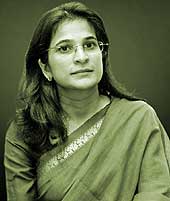 |
| Anjali Bhardwaj Founder, Satark Nagrik Sangathan |
Information rules and Anjali Bhardwaj will tell you how. The founder of the Satark Nagrik Sangathan (SNS), a Delhi-based citizens’ group, has been committed to promoting transparency in governance, and believes that the right to information — a movement that turned into law — is the way to empowerment.
“SNS acts as an interface between the government and the people, most of whom aren’t even aware of their basic rights,” says Bhardwaj. “Once they understand that public funds essentially come out of their pockets, they immediately feel empowered and want to demand what’s rightfully theirs. And the RTI (or the right to information) not only helps citizens realise their rights and entitlements, it also pressurises the government to safeguard them.”
The former World Bank employee became involved with RTI when she, along with other like-minded activists, set up an organisation called Parivartan in 2000. The group’s activities revolved around the Delhi RTI Act, 2001. The canvas was limited, and Bhardwaj wanted to expand the scope of her activism. That’s when she conceptualised the organisation and SNS was born.
“The name Satark Nagrik Sangathan basically means citizens’ vigilance. We are trying to equip people with legal knowledge about their rights, specifically the RTI, which in turn can help them enforce their other rights,” she says.
SNS kicked off as drawing room-level informal sessions. The talks led to the birth of a committed group of volunteers. And finally, an information centre was set up in Malviya Nagar in south Delhi. Initially, SNS worked in slum settlements in the area, training slum-dwellers to use the RTI to ensure delivery of critical services such as education, sanitation.
Bhardwaj is an economist by training and holds a degree in environmental management from Oxford. Before plunging into full-time activism, she worked for the World Bank as a consultant.
“Governance is inextricably linked to most of the issues an institution like the World Bank deals with. But the funds that are allocated for sectors such as health and education are a minuscule percentage of the total spending of the government. Also, they rarely reach the intended beneficiaries,” she says.
It wasn’t easy moving from a structured, well-paid environment to an informal and mostly non-paying set-up like SNS. But Bhardwaj stresses that her involvement with SNS is no social service. “I feel that this is one of the most meaningful ways I have found of achieving what I set out to do — which was to work in the field of development. It is not as a service to somebody else, I look at it as a way of correcting things that I thought were wrong with the system.”
The system, clearly, has been replete with challenges. When Bhardwaj finished her schooling from Delhi Public School, R.K. Puram, in 1991, there were plenty of choices before her. But growing up in an era whose buzzwords were liberalisation and globalisation, Bhardwaj thought that traditional careers were not for her.
“Those were exciting times and subsequently my interest in economics as a subject was aroused,” she says. Bhardwaj, now in her thirties, joined Lady Shri Ram College for Women (LSR) as a student of economics. “LSR has always had a very charged atmosphere and the activities I was involved in helped open up my mind to current affairs issues,” says Bhardwaj, who trained as a vocalist in Indian classical music and was also the college union president.
Convinced that change comes through information, Bhardwaj found herself drawn into the RTI movement. She is a member of the National Campaign for People’s Rights to Information. She was a part of the group’s working committee, which created the draft proposal for the RTI Act, 2004.
Bhardwaj does not regret the choices she has made. Just recently, Pushpa Devi, who lives in a slum in Delhi, underscored the power of information. She wanted her child to study in a public school since under a Delhi High Court directive, all public schools have to reserve 20 per cent of their seats for the poor. On getting no response from the school, she filed an application under the RTI law, demanding information on the number of seats that the school had reserved for the poor.
The school responded at once, giving admission to her son, as well as uniforms and books. With the help of the RTI law, Pushpa Devi has also got her daughter’s date of birth registered, and managed a scholarship for her.
No, Bhardwaj has no regrets.
Based on a conversation with Amrita Johri and Neha Kumar in New Delhi.










